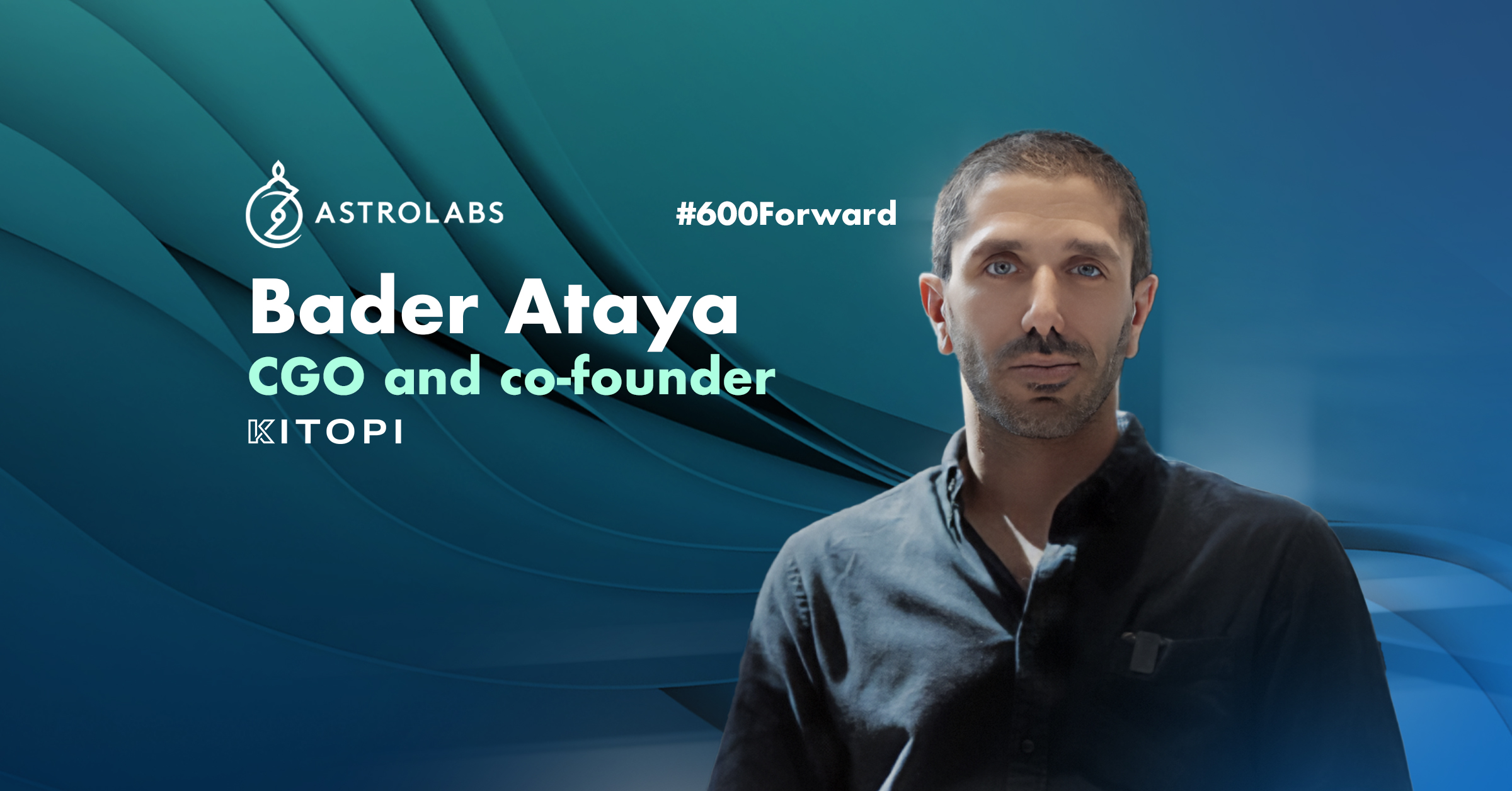There’s always a first mover in every sector—that one player that comes in to challenge operating models and disrupt all existing equations in the market. The advantage of being an early mover in embracing technology in the cloud kitchen space has never been so starkly apparent as it is in the case of Kitopi. The foodtech innovator has been on a buoyant upward growth trajectory since the launch of its services in 2018, having grown its network of partner restaurants to over 200 brands across eight countries. Not only has Kitopi reshaped the culinary scene in its current locations, but it has also become one of the most well-funded technology companies in the Gulf region, boasting a valuation exceeding $1.5 billion.
At AstroLabs, we have recently celebrated the milestone of expanding high-growth companies to Saudi Arabia. On this occasion, we spoke to Bader Ataya, co-founder and chief growth officer of Kitopi, which expanded to the Saudi market back in 2019 through AstroLabs. In this conversation, Ataya reflects on the company’s growth journey in the Kingdom, the reasons why it is an attractive market for foodtech businesses, and the company’s efforts to embrace clean energy in the food delivery sector.
Partnering up with AstroLabs has enabled the company to accelerate its time in the Saudi market, which played a pivotal role in driving the company’s strategic development and its impact.
“AstroLabs was incredible in the sense that they held our hand through every step of the journey from setting up license to having a bank account. As well as getting my launch team visas so that we were able to be in the market and record time, they gave us an office space where the team was able to work rather than typically working in construction sites or kitchens,” says Ataya, stressing the need for third-party partners to facilitate smoother Saudi market entry.
This fell in line with the findings of a recently conducted survey by AstroLabs, which showed that both companies exploring entry to the Saudi market or already operating there have a basic to intermediate level of familiarity with the market’s landscape.
The overwhelming majority of respondents expressed the need for third-party business partners well cognizant of the local market dynamics to help them navigate the market entry and business setup process more diligently.
Never miss the latest. Subscribe to our Insights Monthly!
Saudi Arabia as a growing foodtech market
Kitopi is among a growing list of companies looking to capitalize on the growth opportunities presented by the country’s fastest-growing food and beverage (F&B) sector. According to research group Mordor Intelligence, the local F&B sector is projected to be worth $23.5 billion in 2034, growing at a 3.44 percent compound annual growth rate (CAGR) to reach $27.83 billion by 2029.
The country’s vibrant food space, coupled with its thriving business sector, opens up massive growth opportunities for further innovation and development within the foodtech space, including cloud kitchens.
The expansion of cloud kitchen space is being fueled by the country’s growing tourism sector. With its status as a global tourist and business hub set to solidify further, thanks to upcoming international events like Expo 2030, the Kingdom will witness a increased influx of of tourists and a higher demand for cutting-edge foodtech solutions.
Moreover, Ataya shares that the company’s merger and acquisition (M&A) efforts have largely been concentrated in Saudi Arabia now, as it looks to partner with and scale local food and beverage (F&B) brands.
“I am very much ingrained in the food scene there, and you can get to see the best restaurants from all across the world opening up in Saudi Arabia; whether it’s a Michelin-starred restaurant or a small shop in Italy that is interested in being in Riyadh, you can get that there today. Additionally, many unbelievable entrepreneurs are developing concepts that are now scaling everywhere,” he adds.
“We are identifying restaurant concepts that we are investing in or buying and then helping scale in many major markets, first across South Asia, then the Gulf, and then potentially across the world.”
Driving sustainability through foodtech
For Kitopi, the driving reason behind the imminent growth in the local cloud kitchen space is the continued demand for food delivery, which constitutes around 80 percent of the company’s sales.
As the company scales its operations across its core markets, it also puts great emphasis on lowering the carbon footprint in the booming food delivery industry.
Toward that end, Ataya says that the company has recently done a lot of integrations with strategic partners to accelerate the momentum behind clean energy and achieve Net Zero emissions, a goal that Saudi Arabia aims to realize by 2060.
The company along with its energy partners remains committed to advancing climate tech solutions, thereby achieving the sustainability goals outlined in Saudi Arabia’s Vision 2030.
Elaborating on the company’s recent initiatives in that regard, he says: “I’m proud to say that we have now converted our packaging to around 89 percent plastic, and our goal is to contribute nothing to landfills moving forward. Also, we are segregating our nonfood and food waste. We send that food waste to a partner business to be later converted to animal feed and plant fertilizers and then used in vertical farms.”
“We have a lot of assets including kitchens and restaurants, and we are engaging with a lot of different businesses that help us reduce the amount of water and food waste as well as convert our electricity from an on-grid to a solar panel,” he further explains.
Last year, Kitopi partnered with Yellow Door Energy, a fellow company within the AstroLabs’ expansion network, to establish a 523-kilowatt solar plant, which is expected to generate 838 megawatt-hours of clean energy in its first year of operation.
“This is a big priority for our business. It started as a priority last year, and it is an ongoing matter that we will dedicate more and more resources to over time. And I’m seeing this behavior shift across the majority of businesses in the region as well,” Ataya concludes.

